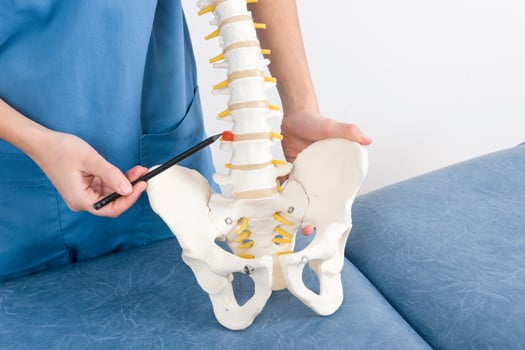
Spinal discs are surprisingly resilient and durable. For this reason, it is not unusual for disc-related symptoms to eventually go away. This is sometimes the case with herniated discs, a common problem often associated with age, sudden trauma, and excess or repetitive pressure in certain areas such as the lower back. This article will discuss whether or not a herniated disc, also commonly known as a "slipped disc" or “ruptured disc,” can suddenly get better.
Herniated Disc Pain Often Goes Away (but Not Always Suddenly)
According to data cited by Harvard Health Publishing, discomfort associated with a herniated disc goes away about 90 percent of the time for affected individuals, usually within six months or so. Symptoms associated with a damaged spinal disc may also go away as your body "attacks" the disc material sticking out of the shell as a foreign object. Over time, the material being targeted may shrink enough to ease nerve pressure.
Herniated Discs May Shift and Relieve Pain Fairly Suddenly
Symptoms associated with a herniated disc may eventually go away over a period of several months, but this is not "sudden" relief. However, there are times when the affected disc may shift or move in a way that noticeably decreases the pain rather suddenly. For instance, the protruding disc material might move because of how you shift your body and ease your discomfort in a more sudden way.
Some Help Is Often Needed
It's also possible to experience fairly sudden relief from herniated disc pain with certain treatments or daily routine adjustments. One way this could happen is with nonsurgical spinal decompression. In this instance, a specially designed moveable table is used to gently stretch tissues and encourage movement of the disc. A herniated disc could also get better fairly suddenly if you respond well to nonsurgical treatment involving:
• Anti-inflammatory medication
• Physical therapy that includes patient-specific stretches and exercises
• Localized injections to improve results with physical therapy
• Posture exercises and improvements
Lumbar Extension Exercises Might Speed Up Relief
A common spot for discs to become herniated is in the lower back area, and there is the potential for a fairly sudden reduction in discomfort with exercises that target this area. These are referred to as lumbar extension exercises. The purpose is to adjust tissues and supporting parts in a way that eases nerve irritation. However, according to Spine Health, there is debate among medical experts as to whether or not exercises of this nature are really effective.
Patients Should Work with Their Doctors to Achieve Meaningful Relief
In some situations, you may experience sudden relief from what you incorrectly assumed was a herniated disc. For example, soft tissue inflammation from another source can produce symptoms similar to those associated with disc herniation. The first step is to get an accurate diagnosis. Sudden relief does sometimes occur. However, more often than not, you'll need to work with your doctor or a specialist to determine the best approach to treatment for your specific needs.
If conservative methods don’t relieve the pain from a herniated disc, treatment recommendations may include a discectomy or a less invasive microdiscectomy. Although this is generally a very successful procedure, patients with a large hole in the outer ring of the disc have a significantly higher risk of reherniation following surgery. Often, the surgeon won’t know the size of the hole until beginning surgery, and having a large hole in the outer ring of the disc more than doubles the risk of needing another operation. A new treatment, Barricaid, is a bone-anchored device that closes this hole, and 95 percent of Barricaid patients didn’t undergo a reoperation due to reherniation in a 2-year study timeframe. This treatment is done immediately following the discectomy—during the same operation—and doesn’t require any additional incisions or time in the hospital.
If you have any questions about the Barricaid treatment, ask your doctor or contact us at 844-288-7474.
For full benefit/risk information, please visit: https://www.barricaid.com/instructions.


Comments